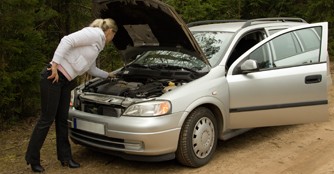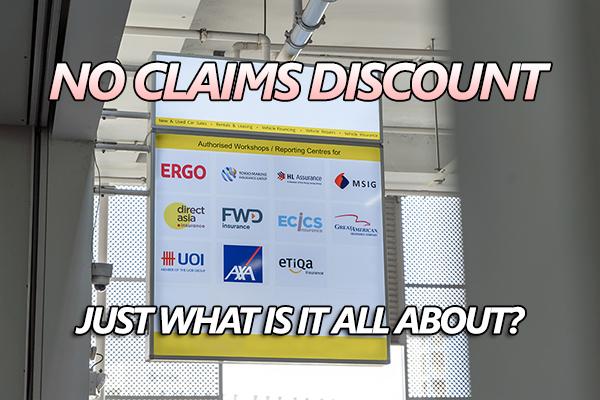Does buying a used car mean you're protected by Lemon Law?
08 Nov 2012|121,653 views
Introduction
Back in February this year, we gave an early introduction about a new consumer law. Known as 'Lemon Law' it was introduced on the first day of September 2012.
The new act was passed in parliament on March 9th 2012 to strengthen consumer protection in Singapore. Already a common tribunal practice in some Western countries, Lemon Law applies to all goods from fashion apparels to motor vehicles (including consumables and perishables), except rental goods, services and buildings.
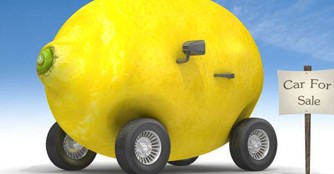
What is Lemon Law?
Lemon Law was imposed to protect consumers against defective goods - for consumers to get their money's worth when purchasing a product.
It strengthens upon the existing Consumer Protection and Hire Purchase Acts and helps consumers to receive a standardised solution when they have unintentionally bought a defective product colloquially known as 'lemons'.
The new Lemon Law provides a transparent and legal framework for both buyers and sellers when faced with return claims.
Under the law, consumers can report a defective item within a period of six months from delivery. Under a two-stage recourse framework, the retailer has an obligation to prove that the reported defect did not exist at time of delivery.
The two stages of Lemon Law
The Lemon Law can be applied in two stages. For the first stage, the consumer can request repair for reported problem or parts replacement within a specified time frame.
The second stage takes effect if the fault is not fixable, the problem persists even after repair or the repair is not satisfactory. In this scenario, you can request for a price reduction - while keeping the product or returning for a full refund.
Who benefits from the new Lemon Law?
Lemon Law benefits consumers whom have unintentionally bought a defective or 'lemon' product including used cars, and would like a repair, refund or replacement from the seller.
Mr. Teo Ser Luck, Minister of State for Trade and Industry explained that the newly implemented lemon law provides consumers and retailers with more options of recourse for defective goods. He also mentioned the new law will align with international jurisdictions.
Singapore has often been perceived as a shopper's paradise and thus, such a law will assure consumers that products they purchase here are of good quality. This in turn improves the image of the retail industry in Singapore.
 |
Lemon law and the local used car market
Recent trimmings in COE allocations and other rising costs have triggered an increased demand for used cars with the used car market (re)getting a larger presence in our local motoring scene.
According to the Consumer Association of Singapore (CASE), motor vehicles related complaints rank fifth among the total numbers received.
Such complaints can now be minimised with the new law. The law covers a wide range of vehicle defects from aesthetics to mechanical related issues, as long as the defect occurred within a six month period from the date of delivery.
In case of a replacement, the COE and Additional Registration Fee (ARF) can be transferred to the replacement vehicle within the stipulated period of six months.
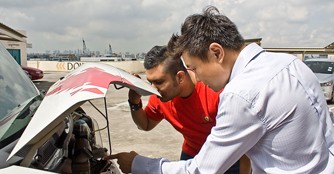
 The law acts as a 'safety harness', a legal voice for consumers who have unfortunate instances of purchasing a sub-standard product.
The law acts as a 'safety harness', a legal voice for consumers who have unfortunate instances of purchasing a sub-standard product.
Lemon law - The consumer's point of view
It is without surprise that, the public welcomes lemon law.
Prior to the lemon law retailers did not practice a standardised exchange or refund policy. Automobiles in Singapore are considered luxury items - yes, even a used car.
As such we can understand the discomfort one goes through when your vehicle starts developing problems months after a sale.
Lemon law for consumers then, provides an opportunity to purchase a used car with ease of mind. Even if the used car becomes from a dream ride to a 'lemon', you know there are ways to get your money's worth.
Recent trimmings in COE allocations and other rising costs have triggered an increased demand for used cars with the used car market (re)getting a larger presence in our local motoring scene.
According to the Consumer Association of Singapore (CASE), motor vehicles related complaints rank fifth among the total numbers received.
Such complaints can now be minimised with the new law. The law covers a wide range of vehicle defects from aesthetics to mechanical related issues, as long as the defect occurred within a six month period from the date of delivery.
In case of a replacement, the COE and Additional Registration Fee (ARF) can be transferred to the replacement vehicle within the stipulated period of six months.

Lemon law - The consumer's point of view
It is without surprise that, the public welcomes lemon law.
Prior to the lemon law retailers did not practice a standardised exchange or refund policy. Automobiles in Singapore are considered luxury items - yes, even a used car.
As such we can understand the discomfort one goes through when your vehicle starts developing problems months after a sale.
Lemon law for consumers then, provides an opportunity to purchase a used car with ease of mind. Even if the used car becomes from a dream ride to a 'lemon', you know there are ways to get your money's worth.
Do note wear and tear is not covered under the law.
Lemon law - The used car dealer's point of view
With the introduction of the law, a pre-purchase inspection checklist to help consumers and dealers was conceived.
Called the Standard Vehicle Assessment Report, this checklist has a list of items ranging from visual, equipment and road test checks which will be concurrently carried out by the used car dealer and customer, in the hopes that the sales process becomes more transparent.
Besides the addition of the Standard Vehicle Assessment Report checklist, the used car dealers mainly see lemon law as a repackaged/summarised variant of already pre-existing laws.
The used car dealers also added how most buyers already understand the complexity surrounding used car conditions.
Besides, they also brought up, with or without the law; most claims made by the consumer will not go beyond mediation stages, as pressing charges is costly and time consuming.
Pre and Post lemon law
Prior to the implementation of lemon law, the problems were always costs arising from unjustified vehicle faults. We say unjustifiable, as a consumer can claim a fault with no backup checklist or evidence to refer upon.
Used car buyers cannot absorb the full repair or replacement costs and thus have to compromise with the consumer. This was widely practiced between dealers and consumers, as they found it troublesome and time consuming to seek legal advice.
The Standard Vehicle Assessment Report is aimed to surface any problems with the vehicle pre-purchase. It supposing acts as a back-up proof and authenticate any faults and errors, no matter how small, between the dealer and the consumer.
As both parties are involved during the checking process, future disagreements can be prevented while the transparent nature of the checklist will justify any repair costs.


Lemon law - The used car dealer's point of view
With the introduction of the law, a pre-purchase inspection checklist to help consumers and dealers was conceived.
Called the Standard Vehicle Assessment Report, this checklist has a list of items ranging from visual, equipment and road test checks which will be concurrently carried out by the used car dealer and customer, in the hopes that the sales process becomes more transparent.
Besides the addition of the Standard Vehicle Assessment Report checklist, the used car dealers mainly see lemon law as a repackaged/summarised variant of already pre-existing laws.
The used car dealers also added how most buyers already understand the complexity surrounding used car conditions.
Besides, they also brought up, with or without the law; most claims made by the consumer will not go beyond mediation stages, as pressing charges is costly and time consuming.
Pre and Post lemon law
Prior to the implementation of lemon law, the problems were always costs arising from unjustified vehicle faults. We say unjustifiable, as a consumer can claim a fault with no backup checklist or evidence to refer upon.
Used car buyers cannot absorb the full repair or replacement costs and thus have to compromise with the consumer. This was widely practiced between dealers and consumers, as they found it troublesome and time consuming to seek legal advice.
The Standard Vehicle Assessment Report is aimed to surface any problems with the vehicle pre-purchase. It supposing acts as a back-up proof and authenticate any faults and errors, no matter how small, between the dealer and the consumer.
As both parties are involved during the checking process, future disagreements can be prevented while the transparent nature of the checklist will justify any repair costs.

Sgcarmart
Ask your preferred dealer for Sgcarmart Warranty
You can ask the dealer to include the warranty with your car purchase!
Read more about Warranty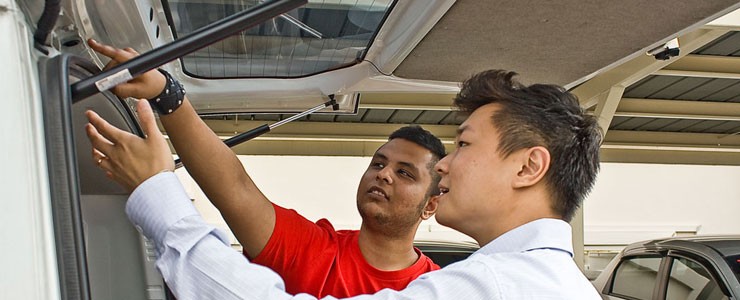 |
Too good to be true
You have read the theory on how the checklist works. But could this be true?
The checklist was conceived to bring about any errors in the used car during a sale. Yet when a problem does arise after purchase it is going to be difficult to prove your claim.
If a fault is detected with the used car during the checking process and the buyer proceeds with the sale, he is voluntarily accepting the fault and is not liable to return to the dealer for a claim.
This is also possible even if a problem that was not present prior to the sale arises because the checklist is primarily flawed.
For example you are purchasing a reasonably well maintained car. Besides a transmission fluid leakage which is reflected in the report, you acknowledge and buy the car willingly and proceed with the sale.
Within two months on the road your car starts developing problems. After inspections with your preferred workshop, besides the existing transmission problem that got worse, there seems to be another problem with the engine. You return to the dealer, explain the problem and expect compensation.
Will the dealer compensate for the fault?
No.
Why?
Well simply because during purchase both the used car dealer and seller acknowledged the transmission error and you, the seller, proceeded with the sale. As you have willingly bought a 'Lemon product' you cannot call for a claim.
Ok, but the engine problem was not present earlier, I can claim for that right?
Yes you can call claim IF you can prove the engine problem was present prior to the sale. In this case since the problem was not reflected in the report prior to sale, from the dealers point-of-view, the engine problem is derived because of the user and does not necessarily relate to the sale of a Lemon product.
So when it comes to automobile coverage then, lemon law and the subsequent checklist acts as a very powerful disclaimer for the dealer and greatly defends them rather than the consumer. Win-Win situation? We doubt so.
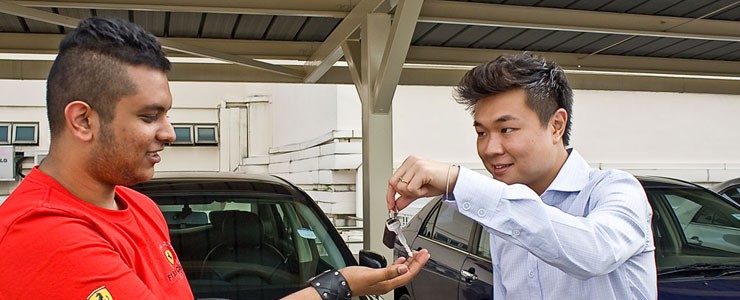 |
Tweaking the law
Besides relying on a checklist that does not benefit the consumer (practically), the SVTA could look into a mandatory standardised vehicle check to be conducted for every used car.
It might incur extra cost, but it provides an added layer of transparency between dealer and seller. Also when it is mandatory and standardised, the consumer would feel at ease and more confident with his purchase.
When the consumers are happy with their purchase and given a good deal, they will patronise a dealership. Moreover do not forget word of mouth advertising, if the used car dealer does a good job, word of mouth advertisement and recommendations can pull in more sales.

 A mandatory vehicle inspection for used cars may offer better protection for consumers of their purchase
A mandatory vehicle inspection for used cars may offer better protection for consumers of their purchase
Lemon law practices: The important things you need to know
Do note that lemon law only applies to business-to-consumer (B-C) sales. It does not apply if you are doing direct sales such as selling your vehicle to another individual (friend, relative) in private or consumer-to-consumer (C-C). Neither will the law cover a business-to-business sale (B-B), for example, between a dealer and a transport company.
Making a claim under Lemon Law
For claims between S$10,000 - S$20,000, consumers and used car dealers can seek the Small Claims Tribunal (SCT) within one year of delivery of goods.
You can check how to lodge a claim with the SCT here and before lodging a claim you might want to read up on the seven processes here.
Alternatively if you do not want to press charges, you can always make a complaint with CASE. If initial negotiations with your dealer fail, you can choose to have a walk-in consultation with CASE. Their Consumer Relations Officer will assess and advice on follow up actions pertaining to your case status.
You can also resolve the issue by filing a case via two methods. The first method sees you joining as a member with CASE where the Consumer Relations Officer will do the follow up actions on your behalf and provide additional advice if the case reaches a deadlock. In other words, CASE acts as your representative.
The second method will have CASE drafting a letter to the dealer that the consumer personally presented. Besides the letter, no Consumer Relations Officer from CASE will follow up the issue and you do not have to join their membership.
Besides relying on a checklist that does not benefit the consumer (practically), the SVTA could look into a mandatory standardised vehicle check to be conducted for every used car.
It might incur extra cost, but it provides an added layer of transparency between dealer and seller. Also when it is mandatory and standardised, the consumer would feel at ease and more confident with his purchase.
When the consumers are happy with their purchase and given a good deal, they will patronise a dealership. Moreover do not forget word of mouth advertising, if the used car dealer does a good job, word of mouth advertisement and recommendations can pull in more sales.

Lemon law practices: The important things you need to know
Do note that lemon law only applies to business-to-consumer (B-C) sales. It does not apply if you are doing direct sales such as selling your vehicle to another individual (friend, relative) in private or consumer-to-consumer (C-C). Neither will the law cover a business-to-business sale (B-B), for example, between a dealer and a transport company.
Making a claim under Lemon Law
For claims between S$10,000 - S$20,000, consumers and used car dealers can seek the Small Claims Tribunal (SCT) within one year of delivery of goods.
You can check how to lodge a claim with the SCT here and before lodging a claim you might want to read up on the seven processes here.
Alternatively if you do not want to press charges, you can always make a complaint with CASE. If initial negotiations with your dealer fail, you can choose to have a walk-in consultation with CASE. Their Consumer Relations Officer will assess and advice on follow up actions pertaining to your case status.
You can also resolve the issue by filing a case via two methods. The first method sees you joining as a member with CASE where the Consumer Relations Officer will do the follow up actions on your behalf and provide additional advice if the case reaches a deadlock. In other words, CASE acts as your representative.
The second method will have CASE drafting a letter to the dealer that the consumer personally presented. Besides the letter, no Consumer Relations Officer from CASE will follow up the issue and you do not have to join their membership.
For issues related to fees and membership costs refer to their website here.
If all else fails, you have the option of mediation which is voluntary. Unlike a judge, the mediator does not make decisions on the disputes in any way and aims for a win-win situation for all.
The final resort will be arbitration. Consumers who would like to seek free legal advice can consult an officer for a case assessment. After consultation, the officer will offer recommendations and may create arrangements to attend the free legal clinic. It will be held one Saturday, a month at CASE office.
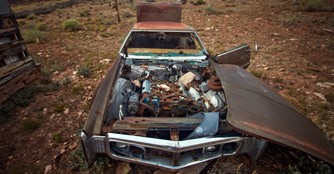
 Considering that the law has only been recently implemented, it is premature to celebrate its success.
Considering that the law has only been recently implemented, it is premature to celebrate its success.
Lemon law effective but just...
However useful lemon law is promised to be for consumers, some dealers see the new law redundant and a summary of already existing laws. According to some of the interviews that were conducted, having a general law which also includes second hand automobiles does not deem fit.
Used cars are not like used gadgets and gizmos. The number of mechanical components and electronics involved are much higher (and complex) as so is wear and tear related issues. The cars have been on the road for a certain number of years under different conditions, and each previous owner would have treated the vehicle differently.
It is believed mass produced automobiles are usually designed and engineered to last for up to 15 years. Volume sellers are mass produced in factories built by high-tech machinery. They have components that will fail at one point of time.
Also, unlike supercars or super luxury vehicles, volume sellers go through quality checks in sample ratios (i.e. for every 1,000 cars maybe 20 gets tested per batch).
No two drivers are the same. Some are causal cruisers while others see it as an essential transport. Thus, the mechanical components do not undergo similar amounts of wear and tear. The term 'wear and tear' as we understand is not defined proper. Faded brake pads, tyres or clutch pads are usually wear and tear issues for the dealer, but not necessarily for the consumer.
Aging is indeed a cruel joke, regardless man-made or natural.
Here are some related articles that might interest you
Lemon Law for cars in Singapore: What you need to know
Lemon Law refund policy frequently asked questions


If all else fails, you have the option of mediation which is voluntary. Unlike a judge, the mediator does not make decisions on the disputes in any way and aims for a win-win situation for all.
The final resort will be arbitration. Consumers who would like to seek free legal advice can consult an officer for a case assessment. After consultation, the officer will offer recommendations and may create arrangements to attend the free legal clinic. It will be held one Saturday, a month at CASE office.

Lemon law effective but just...
However useful lemon law is promised to be for consumers, some dealers see the new law redundant and a summary of already existing laws. According to some of the interviews that were conducted, having a general law which also includes second hand automobiles does not deem fit.
Used cars are not like used gadgets and gizmos. The number of mechanical components and electronics involved are much higher (and complex) as so is wear and tear related issues. The cars have been on the road for a certain number of years under different conditions, and each previous owner would have treated the vehicle differently.
It is believed mass produced automobiles are usually designed and engineered to last for up to 15 years. Volume sellers are mass produced in factories built by high-tech machinery. They have components that will fail at one point of time.
Also, unlike supercars or super luxury vehicles, volume sellers go through quality checks in sample ratios (i.e. for every 1,000 cars maybe 20 gets tested per batch).
No two drivers are the same. Some are causal cruisers while others see it as an essential transport. Thus, the mechanical components do not undergo similar amounts of wear and tear. The term 'wear and tear' as we understand is not defined proper. Faded brake pads, tyres or clutch pads are usually wear and tear issues for the dealer, but not necessarily for the consumer.
Aging is indeed a cruel joke, regardless man-made or natural.
Here are some related articles that might interest you
Lemon Law for cars in Singapore: What you need to know
Lemon Law refund policy frequently asked questions

Sgcarmart
Ask your preferred dealer for Sgcarmart Warranty
You can ask the dealer to include the warranty with your car purchase!
- Eligible for all passenger cars less than 15 years old
- Get this warranty through most car dealers in Singapore
Introduction
Back in February this year, we gave an early introduction about a new consumer law. Known as 'Lemon Law' it was introduced on the first day of September 2012.
The new act was passed in parliament on March 9th 2012 to strengthen consumer protection in Singapore. Already a common tribunal practice in some Western countries, Lemon Law applies to all goods from fashion apparels to motor vehicles (including consumables and perishables), except rental goods, services and buildings.


Lemon Law strengthens upon existing consumer laws and further protects consumers against defective goods
What is Lemon Law?
Lemon Law was imposed to protect consumers against defective goods - for consumers to get their money's worth when purchasing a product.
It strengthens upon the existing Consumer Protection and Hire Purchase Acts and helps consumers to receive a standardised solution when they have unintentionally bought a defective product colloquially known as 'lemons'.
The new Lemon Law provides a transparent and legal framework for both buyers and sellers when faced with return claims.
Under the law, consumers can report a defective item within a period of six months from delivery. Under a two-stage recourse framework, the retailer has an obligation to prove that the reported defect did not exist at time of delivery.
Back in February this year, we gave an early introduction about a new consumer law. Known as 'Lemon Law' it was introduced on the first day of September 2012.
The new act was passed in parliament on March 9th 2012 to strengthen consumer protection in Singapore. Already a common tribunal practice in some Western countries, Lemon Law applies to all goods from fashion apparels to motor vehicles (including consumables and perishables), except rental goods, services and buildings.

Lemon Law strengthens upon existing consumer laws and further protects consumers against defective goods
What is Lemon Law?
Lemon Law was imposed to protect consumers against defective goods - for consumers to get their money's worth when purchasing a product.
It strengthens upon the existing Consumer Protection and Hire Purchase Acts and helps consumers to receive a standardised solution when they have unintentionally bought a defective product colloquially known as 'lemons'.
The new Lemon Law provides a transparent and legal framework for both buyers and sellers when faced with return claims.
Under the law, consumers can report a defective item within a period of six months from delivery. Under a two-stage recourse framework, the retailer has an obligation to prove that the reported defect did not exist at time of delivery.
The two stages of Lemon Law
The Lemon Law can be applied in two stages. For the first stage, the consumer can request repair for reported problem or parts replacement within a specified time frame.
The second stage takes effect if the fault is not fixable, the problem persists even after repair or the repair is not satisfactory. In this scenario, you can request for a price reduction - while keeping the product or returning for a full refund.Who benefits from the new Lemon Law?
Lemon Law benefits consumers whom have unintentionally bought a defective or 'lemon' product including used cars, and would like a repair, refund or replacement from the seller.
Mr. Teo Ser Luck, Minister of State for Trade and Industry explained that the newly implemented lemon law provides consumers and retailers with more options of recourse for defective goods. He also mentioned the new law will align with international jurisdictions.
Singapore has often been perceived as a shopper's paradise and thus, such a law will assure consumers that products they purchase here are of good quality. This in turn improves the image of the retail industry in Singapore.
The Lemon Law can be applied in two stages. For the first stage, the consumer can request repair for reported problem or parts replacement within a specified time frame.
The second stage takes effect if the fault is not fixable, the problem persists even after repair or the repair is not satisfactory. In this scenario, you can request for a price reduction - while keeping the product or returning for a full refund.Who benefits from the new Lemon Law?
Lemon Law benefits consumers whom have unintentionally bought a defective or 'lemon' product including used cars, and would like a repair, refund or replacement from the seller.
Mr. Teo Ser Luck, Minister of State for Trade and Industry explained that the newly implemented lemon law provides consumers and retailers with more options of recourse for defective goods. He also mentioned the new law will align with international jurisdictions.
Singapore has often been perceived as a shopper's paradise and thus, such a law will assure consumers that products they purchase here are of good quality. This in turn improves the image of the retail industry in Singapore.
Lemon law and the local used car market
Recent trimmings in COE allocations and other rising costs have triggered an increased demand for used cars with the used car market (re)getting a larger presence in our local motoring scene.
According to the Consumer Association of Singapore (CASE), motor vehicles related complaints rank fifth among the total numbers received.
Such complaints can now be minimised with the new law. The law covers a wide range of vehicle defects from aesthetics to mechanical related issues, as long as the defect occurred within a six month period from the date of delivery.
In case of a replacement, the COE and Additional Registration Fee (ARF) can be transferred to the replacement vehicle within the stipulated period of six months.

 The law acts as a 'safety harness', a legal voice for consumers who have unfortunate instances of purchasing a sub-standard product.
The law acts as a 'safety harness', a legal voice for consumers who have unfortunate instances of purchasing a sub-standard product.
Lemon law - The consumer's point of view
It is without surprise that, the public welcomes lemon law.
Prior to the lemon law retailers did not practice a standardised exchange or refund policy. Automobiles in Singapore are considered luxury items - yes, even a used car.
As such we can understand the discomfort one goes through when your vehicle starts developing problems months after a sale.
Lemon law for consumers then, provides an opportunity to purchase a used car with ease of mind. Even if the used car becomes from a dream ride to a 'lemon', you know there are ways to get your money's worth.
Recent trimmings in COE allocations and other rising costs have triggered an increased demand for used cars with the used car market (re)getting a larger presence in our local motoring scene.
According to the Consumer Association of Singapore (CASE), motor vehicles related complaints rank fifth among the total numbers received.
Such complaints can now be minimised with the new law. The law covers a wide range of vehicle defects from aesthetics to mechanical related issues, as long as the defect occurred within a six month period from the date of delivery.
In case of a replacement, the COE and Additional Registration Fee (ARF) can be transferred to the replacement vehicle within the stipulated period of six months.

Lemon law - The consumer's point of view
It is without surprise that, the public welcomes lemon law.
Prior to the lemon law retailers did not practice a standardised exchange or refund policy. Automobiles in Singapore are considered luxury items - yes, even a used car.
As such we can understand the discomfort one goes through when your vehicle starts developing problems months after a sale.
Lemon law for consumers then, provides an opportunity to purchase a used car with ease of mind. Even if the used car becomes from a dream ride to a 'lemon', you know there are ways to get your money's worth.
Do note wear and tear is not covered under the law.
Lemon law - The used car dealer's point of view
With the introduction of the law, a pre-purchase inspection checklist to help consumers and dealers was conceived.
Called the Standard Vehicle Assessment Report, this checklist has a list of items ranging from visual, equipment and road test checks which will be concurrently carried out by the used car dealer and customer, in the hopes that the sales process becomes more transparent.
Besides the addition of the Standard Vehicle Assessment Report checklist, the used car dealers mainly see lemon law as a repackaged/summarised variant of already pre-existing laws.
The used car dealers also added how most buyers already understand the complexity surrounding used car conditions.
Besides, they also brought up, with or without the law; most claims made by the consumer will not go beyond mediation stages, as pressing charges is costly and time consuming.
Pre and Post lemon law
Prior to the implementation of lemon law, the problems were always costs arising from unjustified vehicle faults. We say unjustifiable, as a consumer can claim a fault with no backup checklist or evidence to refer upon.
Used car buyers cannot absorb the full repair or replacement costs and thus have to compromise with the consumer. This was widely practiced between dealers and consumers, as they found it troublesome and time consuming to seek legal advice.
The Standard Vehicle Assessment Report is aimed to surface any problems with the vehicle pre-purchase. It supposing acts as a back-up proof and authenticate any faults and errors, no matter how small, between the dealer and the consumer.
As both parties are involved during the checking process, future disagreements can be prevented while the transparent nature of the checklist will justify any repair costs.


Lemon law - The used car dealer's point of view
With the introduction of the law, a pre-purchase inspection checklist to help consumers and dealers was conceived.
Called the Standard Vehicle Assessment Report, this checklist has a list of items ranging from visual, equipment and road test checks which will be concurrently carried out by the used car dealer and customer, in the hopes that the sales process becomes more transparent.
Besides the addition of the Standard Vehicle Assessment Report checklist, the used car dealers mainly see lemon law as a repackaged/summarised variant of already pre-existing laws.
The used car dealers also added how most buyers already understand the complexity surrounding used car conditions.
Besides, they also brought up, with or without the law; most claims made by the consumer will not go beyond mediation stages, as pressing charges is costly and time consuming.
Pre and Post lemon law
Prior to the implementation of lemon law, the problems were always costs arising from unjustified vehicle faults. We say unjustifiable, as a consumer can claim a fault with no backup checklist or evidence to refer upon.
Used car buyers cannot absorb the full repair or replacement costs and thus have to compromise with the consumer. This was widely practiced between dealers and consumers, as they found it troublesome and time consuming to seek legal advice.
The Standard Vehicle Assessment Report is aimed to surface any problems with the vehicle pre-purchase. It supposing acts as a back-up proof and authenticate any faults and errors, no matter how small, between the dealer and the consumer.
As both parties are involved during the checking process, future disagreements can be prevented while the transparent nature of the checklist will justify any repair costs.

Sgcarmart
Ask your preferred dealer for Sgcarmart Warranty
You can ask the dealer to include the warranty with your car purchase!
Read more about WarrantyToo good to be true
You have read the theory on how the checklist works. But could this be true?
The checklist was conceived to bring about any errors in the used car during a sale. Yet when a problem does arise after purchase it is going to be difficult to prove your claim.
If a fault is detected with the used car during the checking process and the buyer proceeds with the sale, he is voluntarily accepting the fault and is not liable to return to the dealer for a claim.
This is also possible even if a problem that was not present prior to the sale arises because the checklist is primarily flawed.
For example you are purchasing a reasonably well maintained car. Besides a transmission fluid leakage which is reflected in the report, you acknowledge and buy the car willingly and proceed with the sale.
You have read the theory on how the checklist works. But could this be true?
The checklist was conceived to bring about any errors in the used car during a sale. Yet when a problem does arise after purchase it is going to be difficult to prove your claim.
If a fault is detected with the used car during the checking process and the buyer proceeds with the sale, he is voluntarily accepting the fault and is not liable to return to the dealer for a claim.
This is also possible even if a problem that was not present prior to the sale arises because the checklist is primarily flawed.
For example you are purchasing a reasonably well maintained car. Besides a transmission fluid leakage which is reflected in the report, you acknowledge and buy the car willingly and proceed with the sale.
Within two months on the road your car starts developing problems. After inspections with your preferred workshop, besides the existing transmission problem that got worse, there seems to be another problem with the engine. You return to the dealer, explain the problem and expect compensation.
Will the dealer compensate for the fault?
No.
Why?
Well simply because during purchase both the used car dealer and seller acknowledged the transmission error and you, the seller, proceeded with the sale. As you have willingly bought a 'Lemon product' you cannot call for a claim.
Ok, but the engine problem was not present earlier, I can claim for that right?
Yes you can call claim IF you can prove the engine problem was present prior to the sale. In this case since the problem was not reflected in the report prior to sale, from the dealers point-of-view, the engine problem is derived because of the user and does not necessarily relate to the sale of a Lemon product.
So when it comes to automobile coverage then, lemon law and the subsequent checklist acts as a very powerful disclaimer for the dealer and greatly defends them rather than the consumer. Win-Win situation? We doubt so.
Tweaking the law
Besides relying on a checklist that does not benefit the consumer (practically), the SVTA could look into a mandatory standardised vehicle check to be conducted for every used car.
It might incur extra cost, but it provides an added layer of transparency between dealer and seller. Also when it is mandatory and standardised, the consumer would feel at ease and more confident with his purchase.
When the consumers are happy with their purchase and given a good deal, they will patronise a dealership. Moreover do not forget word of mouth advertising, if the used car dealer does a good job, word of mouth advertisement and recommendations can pull in more sales.

 A mandatory vehicle inspection for used cars may offer better protection for consumers of their purchase
A mandatory vehicle inspection for used cars may offer better protection for consumers of their purchase
Lemon law practices: The important things you need to know
Do note that lemon law only applies to business-to-consumer (B-C) sales. It does not apply if you are doing direct sales such as selling your vehicle to another individual (friend, relative) in private or consumer-to-consumer (C-C). Neither will the law cover a business-to-business sale (B-B), for example, between a dealer and a transport company.
Making a claim under Lemon Law
For claims between S$10,000 - S$20,000, consumers and used car dealers can seek the Small Claims Tribunal (SCT) within one year of delivery of goods.
You can check how to lodge a claim with the SCT here and before lodging a claim you might want to read up on the seven processes here.
Alternatively if you do not want to press charges, you can always make a complaint with CASE. If initial negotiations with your dealer fail, you can choose to have a walk-in consultation with CASE. Their Consumer Relations Officer will assess and advice on follow up actions pertaining to your case status.
You can also resolve the issue by filing a case via two methods. The first method sees you joining as a member with CASE where the Consumer Relations Officer will do the follow up actions on your behalf and provide additional advice if the case reaches a deadlock. In other words, CASE acts as your representative.
The second method will have CASE drafting a letter to the dealer that the consumer personally presented. Besides the letter, no Consumer Relations Officer from CASE will follow up the issue and you do not have to join their membership.
Besides relying on a checklist that does not benefit the consumer (practically), the SVTA could look into a mandatory standardised vehicle check to be conducted for every used car.
It might incur extra cost, but it provides an added layer of transparency between dealer and seller. Also when it is mandatory and standardised, the consumer would feel at ease and more confident with his purchase.
When the consumers are happy with their purchase and given a good deal, they will patronise a dealership. Moreover do not forget word of mouth advertising, if the used car dealer does a good job, word of mouth advertisement and recommendations can pull in more sales.

Lemon law practices: The important things you need to know
Do note that lemon law only applies to business-to-consumer (B-C) sales. It does not apply if you are doing direct sales such as selling your vehicle to another individual (friend, relative) in private or consumer-to-consumer (C-C). Neither will the law cover a business-to-business sale (B-B), for example, between a dealer and a transport company.
Making a claim under Lemon Law
For claims between S$10,000 - S$20,000, consumers and used car dealers can seek the Small Claims Tribunal (SCT) within one year of delivery of goods.
You can check how to lodge a claim with the SCT here and before lodging a claim you might want to read up on the seven processes here.
Alternatively if you do not want to press charges, you can always make a complaint with CASE. If initial negotiations with your dealer fail, you can choose to have a walk-in consultation with CASE. Their Consumer Relations Officer will assess and advice on follow up actions pertaining to your case status.
You can also resolve the issue by filing a case via two methods. The first method sees you joining as a member with CASE where the Consumer Relations Officer will do the follow up actions on your behalf and provide additional advice if the case reaches a deadlock. In other words, CASE acts as your representative.
The second method will have CASE drafting a letter to the dealer that the consumer personally presented. Besides the letter, no Consumer Relations Officer from CASE will follow up the issue and you do not have to join their membership.
For issues related to fees and membership costs refer to their website here.
If all else fails, you have the option of mediation which is voluntary. Unlike a judge, the mediator does not make decisions on the disputes in any way and aims for a win-win situation for all.
The final resort will be arbitration. Consumers who would like to seek free legal advice can consult an officer for a case assessment. After consultation, the officer will offer recommendations and may create arrangements to attend the free legal clinic. It will be held one Saturday, a month at CASE office.

 Considering that the law has only been recently implemented, it is premature to celebrate its success.
Considering that the law has only been recently implemented, it is premature to celebrate its success.
Lemon law effective but just...
However useful lemon law is promised to be for consumers, some dealers see the new law redundant and a summary of already existing laws. According to some of the interviews that were conducted, having a general law which also includes second hand automobiles does not deem fit.
Used cars are not like used gadgets and gizmos. The number of mechanical components and electronics involved are much higher (and complex) as so is wear and tear related issues. The cars have been on the road for a certain number of years under different conditions, and each previous owner would have treated the vehicle differently.
It is believed mass produced automobiles are usually designed and engineered to last for up to 15 years. Volume sellers are mass produced in factories built by high-tech machinery. They have components that will fail at one point of time.
Also, unlike supercars or super luxury vehicles, volume sellers go through quality checks in sample ratios (i.e. for every 1,000 cars maybe 20 gets tested per batch).
No two drivers are the same. Some are causal cruisers while others see it as an essential transport. Thus, the mechanical components do not undergo similar amounts of wear and tear. The term 'wear and tear' as we understand is not defined proper. Faded brake pads, tyres or clutch pads are usually wear and tear issues for the dealer, but not necessarily for the consumer.
Aging is indeed a cruel joke, regardless man-made or natural.
Here are some related articles that might interest you
Lemon Law for cars in Singapore: What you need to know
Lemon Law refund policy frequently asked questions


If all else fails, you have the option of mediation which is voluntary. Unlike a judge, the mediator does not make decisions on the disputes in any way and aims for a win-win situation for all.
The final resort will be arbitration. Consumers who would like to seek free legal advice can consult an officer for a case assessment. After consultation, the officer will offer recommendations and may create arrangements to attend the free legal clinic. It will be held one Saturday, a month at CASE office.

Lemon law effective but just...
However useful lemon law is promised to be for consumers, some dealers see the new law redundant and a summary of already existing laws. According to some of the interviews that were conducted, having a general law which also includes second hand automobiles does not deem fit.
Used cars are not like used gadgets and gizmos. The number of mechanical components and electronics involved are much higher (and complex) as so is wear and tear related issues. The cars have been on the road for a certain number of years under different conditions, and each previous owner would have treated the vehicle differently.
It is believed mass produced automobiles are usually designed and engineered to last for up to 15 years. Volume sellers are mass produced in factories built by high-tech machinery. They have components that will fail at one point of time.
Also, unlike supercars or super luxury vehicles, volume sellers go through quality checks in sample ratios (i.e. for every 1,000 cars maybe 20 gets tested per batch).
No two drivers are the same. Some are causal cruisers while others see it as an essential transport. Thus, the mechanical components do not undergo similar amounts of wear and tear. The term 'wear and tear' as we understand is not defined proper. Faded brake pads, tyres or clutch pads are usually wear and tear issues for the dealer, but not necessarily for the consumer.
Aging is indeed a cruel joke, regardless man-made or natural.
Here are some related articles that might interest you
Lemon Law for cars in Singapore: What you need to know
Lemon Law refund policy frequently asked questions

Sgcarmart
Ask your preferred dealer for Sgcarmart Warranty
You can ask the dealer to include the warranty with your car purchase!
- Eligible for all passenger cars less than 15 years old
- Get this warranty through most car dealers in Singapore

















